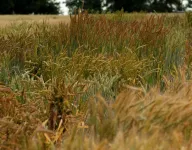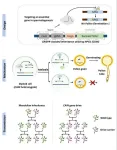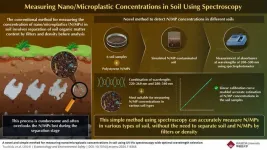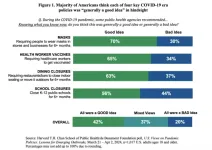(Press-News.org) A decade-long collaborative study has discovered huge genetic potential that is untapped in modern wheat varieties.
The international study which appears in Nature reveals that at least 60% of the genetic diversity found in a historic collection of wheat is unused providing an unprecedented opportunity to improve modern wheat and sustainably feed a growing global population.
To make this discovery, a cross-institutional collaboration led by Dr Simon Griffiths, at the John Innes Centre and Professor Shifeng Cheng at the Agricultural Genomics Institute at Shenzhen, Chinese Academy of Agricultural Sciences (CAAS), studied the A.E. Watkins Landrace Collection, a historic collection of local varieties of wheat which are no longer grown anywhere in the world and compared this with modern wheats.
The achievement is the result of a consortium joint effort, Professor Cheng says, “We built a collaborative and complementary consortium with full openness, making resources in germplasm, genomic and phenotypic datasets, publicly available through the Watkins Worldwide Wheat Genomics to Breeding Portal (https://wwwg2b.com/). Our effort has facilitated and accelerated many existing projects both in fundamental research and in breeding practices”.
One of the key factors that contributes to the success is the in-depth phenotyping, covering experimental stations from the UK (three locations) and field evaluation (five locations) from northern to southern China. In total, 137 traits were surveyed in this study. This work was particularly underpinned by Rothamsted Research, who worked as a phenotyping hub to add understanding of the qualities and characteristics of the wheat, to connect the crop to the genetic sequence.
The team built a wheat genomic variation map, a haplotype-phenotype association map. The landrace-cultivar comparison revealed that modern wheat varieties only make use of 40% of the genetic diversity found in the Watkins Collection.
The remaining diversity represents a goldmine of potential to improve modern wheat, says Dr Griffiths, group leader at the John Innes Centre, and an author of the paper, “This missing 60% discovered in this study is full of beneficial genes that we need to feed people sustainably. Over the last ten thousand years we’ve tended to select for traits which increase yield and improve disease resistance.”
“We’ve found that the Watkins landraces are packed full of useful variation which is simply absent in modern wheat, and it is imperative to deploy this into modern breeding. What’s exciting is that genes and traits are already being discovered using the data and tools developed over the past decade.”
The A.E. Watkins landrace collection of bread wheat (Watkins collection) assembled in the 1920s and 1930s from 32 countries, represents the most comprehensive collection of historic wheat anywhere in the world.
The collection provides a snapshot of the diversity of cultivated wheat before the advent of modern, systematic plant breeding and shows how the genetic variation is dispersed in clusters, or ancestral groups, around the world. “We can retrace the novel, functional and beneficial diversity that were lost in modern wheats after the ‘Green Revolution’ in the 20th century, and have the opportunity to add them back into elites in the breeding programmes”, says Professor Cheng.
Genomics and bioinformatics analysis completed by researchers at the Agricultural Genomics Institute at Shenzhen, allowed the consortium to see where modern wheat came from. They discovered that globally, wheat varieties originate from central and western Europe, with just two of the seven ancestral groups in the Watkins collection being used in modern plant breeding.
Using three complementary association genetics approaches (QTL mapping, GWAS and NAM GWAS), the team discovered hundreds of Watkins-unique haplotypes that can confer superior traits in modern wheats, informing breeders to know what accessions carry what useful genetic loci or alleles in their breeding programmes.
Key traits already found in this untapped diversity include nitrogen use efficiency, slug resistance and resilience to pests and diseases.
Dr Griffiths adds, “There are genes which will enable plant breeders to increase the efficiency of nitrogen use in wheat, if we can get these into modern varieties that farmers can grow, they will need to apply less fertilizer, saving money and reducing emissions.”
Fertilizer use in agriculture is expensive and contributes to emissions of greenhouse gases, reducing its use could help agriculture to move towards net zero. Enhancing nitrogen use efficiency in crops and reducing agriculture’s nitrogen footprint is currently a big challenge globally, especially for countries like China.
To achieve this unprecedented research feat, the team developed a core set of 119 landraces which represented the breadth of the genetic variation within the Watkins collection. This diversity set was then crossed and back crossed them into modern wheat to make a collection of 12,000 lines of wheat that are now stored in the Germplasm Resource Unit at the John Innes Centre.
This means that for the first time in 100 years these lost traits have been incorporated into modern wheat, and the data and tools are already being used to improve crops.
This research establishes a framework for wheat whole-genome design pre-breeding by connecting genomics to phenomics and to breeding practice. “We implemented a pre-breeding strategy to decode, discover, design and deliver progress in breeding”, says Dr Griffiths. “Indeed, the genomics revolution is leading to the genetic revolution and a breeding revolution”, says Shifeng Cheng. This study was truly a collaborative, long-term, endeavour and couldn’t have been completed without international cooperation and long-term funding.
In collaboration with UK commercial plant breeders the team have created the freely available breeder’s toolkit, a set of online resources which are open source and accessible globally for anyone to use. The toolkit provides an integrated set of tools for the research and breeding communities allows others to access and use new, beneficial diversity to deliver sustainable, resilient wheat now and into the future. These germplasms, the resources and toolkits developed in this study, are still under further investigation in various experimental stations in China. We can expect that these efforts will significantly contribute to wheat genetic improvement and breeding in China.
The paper “Harnessing landrace diversity empowers wheat breeding” is published in Nature
END
Finding hidden genetic treasure: Study uncovers untapped diversity in historic wheat collection
2024-06-17
ELSE PRESS RELEASES FROM THIS DATE:
Researchers develop plant gene drive system for enhanced trait inheritance
2024-06-17
A collaborative research team led by QIAN Wenfeng from the Institute of Genetics and Developmental Biology (IGDB) of the Chinese Academy of Sciences and Peking University has developed a plant gene drive system called CRISPR-Assisted Inheritance utilizing NPG1 (CAIN), which, according to the researchers, uses a toxin-antidote mechanism in the male germline to override Mendelian inheritance in plants.
Their findings were published in Nature Plants.
In nature, gene inheritance typically follows Mendel's laws, which provide an equal chance for alleles to pass on to ...
Children’s Tumor Foundation presents the 2024 Global NF Conference in Brussels: Shaping what’s next for NF
2024-06-17
(NEW YORK, NY and BRUSSELS, BELGIUM) - June 17, 2024 - The 2024 Global NF Conference, organized by the Children’s Tumor Foundation (CTF) and the European NF Group, and hosted by Children's Tumor Foundation Europe, is the foremost assembly defining the scientific and medical future of the genetic conditions neurofibromatosis and schwannomatosis (known collectively as NF). This global gathering, taking place from June 20-25 at THE EGG in Brussels, Belgium, will connect over 1,000 attendees for up-to-date knowledge and insights in the growing fields of NF research ...
Researchers discover potential mole reversal therapy in rare condition
2024-06-17
Francis Crick Institute press
Peer reviewed
Experimental study
Cells, people and animals
*Case studies available for interview*
Researchers discover potential mole reversal therapy in rare condition
“Knowing there has been a huge step forward in the CMN research and there could be a chance of Ada’s CMN being reversed and possibly reducing Ada’s risk of developing melanoma, has blown our expectations out the water.” Ada’s Mum and Dad, Rachelle and Greg
Researchers at the Francis Crick Institute, UCL Great Ormond Street Institute for Child Health and Great Ormond Street ...
Threefold improvement of solid oxide fuel cell in 4 minutes
2024-06-17
Dr. Yoonseok Choi from the Hydrogen Convergence Materials Laboratory at the Korea Institute of Energy Research (KIER), in collaboration with Professor WooChul Jung from the Department of Materials Science and Engineering at KAIST and Professor Beom-Kyung Park from the Department of Materials Science and Engineering at Pusan National University, has successfully developed a catalyst coating technology that significantly improves the performance of solid oxide fuel cells (SOFCs) in just 4 minutes.
Fuel cells are gaining attention as highly efficient and clean energy devices driving the hydrogen economy. Among them, solid ...
New initiative aims to help tens of thousands with recurrent pericarditis
2024-06-17
DALLAS, June 17, 2024 — About 40,000 people in the United States experience recurrent pericarditis, or inflammation of the sac-like structure that protects the heart, which can cause chest pain and may lead to fluid buildup around the heart muscle.
The American Heart Association, celebrating 100 years of lifesaving service in 2024, is launching a three-year initiative to empower patients and equip health care providers with up-to-date science to inform recurrent pericarditis care decisions.
The Addressing Recurrent Pericarditis initiative, supported by Kiniksa Pharmaceuticals, aims to improve diagnosis, treatment and quality of life for those with ...
Multiple new awards recognize NCCN as exceptional source for information for cancer patients and caregivers
2024-06-17
PLYMOUTH MEETING, PA [June 17, 2024] — The National Comprehensive Cancer Network® (NCCN®) today announced new recognitions for the award-winning library of NCCN Guidelines for Patients® and NCCN Patient Webinars. The NCCN Guidelines for Patients: Colon Cancer earned a Gold Award from Hemes Creative Awards for Electronic Media/Social Media/Interactive Media/Digital Publications/Messaging. The NCCN Guidelines for Patients: Kidney Cancer earned an Award of Distinction from The Communicator Awards for Print Content—Medical. Additionally, the NCCN Patient Webinar for Uterine Cancer has been named a Gold Winner from the Viddy Awards while the NCCN Patient Webinar ...
Study shows a high-fat diet may fuel anxiety
2024-06-17
When stressed out, many of us turn to junk food for solace. But new University of Colorado Boulder research suggests this strategy may backfire.
The study found that in animals, a high-fat diet disrupts resident gut bacteria, alters behavior and, through a complex pathway connecting the gut to the brain, influences brain chemicals in ways that fuel anxiety.
“Everyone knows that these are not healthy foods, but we tend to think about them strictly in terms of a little weight gain,” said lead author Christopher Lowry, a professor of integrative physiology at CU Boulder. “If you understand that they also impact your brain in a way that ...
Novel method for measuring nano/microplastic concentrations in soil using spectroscopy
2024-06-17
Nano and microplastics are a well-known menace, found practically everywhere in nature, including soil, oceans, drinking water, air, and even the human body. Studies show that soils in particular hold a significant portion of N/MPs. The problem with these N/MPs is their microscopic size, which allows them to easily migrate through soil into the ground or freshwater bodies due to rainwater leaching. From there, they enter the human body. Hence, it is imperative to understand the distribution and movement of the soil’s N/MPs to gauge their threat and mitigate it.
Current ...
Poll: Majority of Americans say key COVID-19 policies were a good idea—but views of individual policies vary
2024-06-17
Embargoed for release: Monday, June 17, 6:00 AM ET
Boston, MA—A majority of Americans say that several key policies to stop the spread of COVID-19 were generally a good idea in hindsight, according to a new national poll by Harvard T.H. Chan School of Public Health and the de Beaumont Foundation. The poll also found, however, that views varied across policies, and many say the policies had negative impacts.
The poll, U.S. Views on Pandemic Policies: Lessons for Emerging Outbreaks, was conducted March 21 to April 2, 2024, among a nationally representative, probability-based sample of 1,017 adults ages 18 or older.
A majority of Americans say four key pandemic policies ...
Six distinct types of depression identified in Stanford Medicine-led study
2024-06-17
In the not-too-distant future, a screening assessment for depression could include a quick brain scan to identify the best treatment.
Brain imaging combined with machine learning can reveal subtypes of depression and anxiety, according to a new study led by researchers at Stanford Medicine. The study, to be published June 17 in the journal Nature Medicine, sorts depression into six biological subtypes, or “biotypes,” and identifies treatments that are more likely or less likely to work ...







